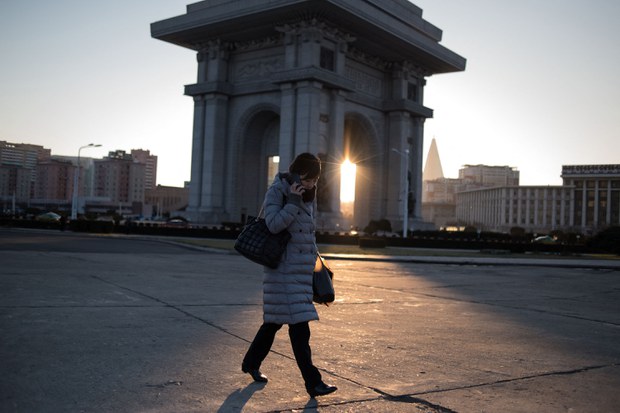North Korea arrests entire family after mother called South Korea
Share

In this 2016 file photo, a woman uses a mobile phone as she walks past the Arch of Triumph in Pyongyang, North Korea.
Authorities in North Korea have arrested a family of four after one of them was caught making banned telephone calls to her child in South Korea, a punishment that residents say is excessive, sources in the country told Radio Free Asia.
While it is illegal for North Koreans to maintain contact with any family members who have escaped to the South, staying in touch with them through the use of cellular phones on the Chinese network is fairly easy in the areas near the Chinese border.
If they are caught, in most cases they can bribe the police to look the other way, and if that does not work, then it’s usually only the caller who gets arrested.
But now it appears that their families will also be considered guilty by association, and residents are nervous that they too could be punished for the actions of others, a resident of the northeastern province of North Hamgyong told RFA on condition of anonymity for security reasons.
“In my neighborhood close to the border, there have been occasional incidents where people have gotten arrested on charges of making telephone connections with South Korea,” said the source. “But this is the first time I’ve witnessed an entire family being taken away.”
According to the source, authorities caught the mother in the act of calling her child who escaped to the South.
“On the 21st, [she] was arrested on the spot when she was caught making a call far away from her home,” the source said. “The people saw police drag the three other family members out of their home and arrest them, even though they were not present at the scene of the call.”
As news spread of their arrests the residents became increasingly nervous, according to the source.
“They said that authorities have escalated to a new level by arresting the entire family,” said the source. “They are blaming the authorities for being too harsh.”
The source said that the harsh measure may have been to make an example of the family, because this is the first time they caught someone calling South Korea this year.
“This is meant as a warning to the other residents that the entire family will be severely punished if they are caught talking on the phone with South Korea,” the source said.
Impoverished and autocratic North Korea is highly wary of the cultural influence and soft power of the prosperous and democratic South and works hard to keep its people from contacting southerners or consuming South Korean movies, television and music.
News of the North Hamgyong arrests has reached neighboring Ryanggang province, and a source there, who declined to be named, told RFA that authorities have been beefing up surveillance to stop people from calling outside the country.
“To make a phone call on the Chinese network, you have to go out of the city to get to the highlands, which can take two hours,” said the second source. “Inspectors … are frequently monitoring the movements and travels of defectors’ families.”
Though the term “defector” is widely used in colloquial speech to refer to anyone who escapes from North Korea, human rights organizations prefer to use that term only for those who were in the military or government when they escaped. They refer to others as either “refugees” or “escapees.”
The arrest in North Hamgyong was because an inspector had been assigned to track the whereabouts of all of the family members, and tipped off police when the mother left to make the call, the second source said.
“In the past, the [authorities] entrusted the monitoring of the residents’ movements to the head of the neighborhood-watch unit,” the second source said. “However, starting this year, people who cooperate with the authorities are selected from among the residents of the same neighborhood. They are now used as the watchdogs.”
People caught calling the South are to be charged with “leaking internal secrets,” according to the second source.
“The number of neighborhood-watch unit leaders, informants, and security teams who follow the direction of the State Security Department and the Social Security Department to inspect residents’ movements has increased significantly,” the second source said. “Neighbors are suspicious and wary of each other.”
While the exact number of illegal phone users in North Korea is unknown, the Database Center for North Korean Human Rights, which interviewed 414 North Koreans in the South, reported that 47 percent of them were in constant contact with their families in the North in 2018. Of those, about 93 percent said they called their families on the phone.
In the same survey, 62 percent said they had sent money to North Korea. Based on their answers, the center estimated that refugees in the South who send money to North Korea do it about twice per year, sending around 2.7 million South Korean won (U.S. $2,190) each time.
Each time they had to pay an average broker fee of almost 30 percent.
According to South Korea’s Ministry of Unification, around 33,000 North Koreans have settled in South Korea since 1998, but arrivals have decreased significantly since 2020, likely due to border restrictions in North Korea and China during the COVID-19 pandemic.
Translated by Claire Shinyoung Oh Lee. Edited by Eugene Whong and Paul Eckert.







